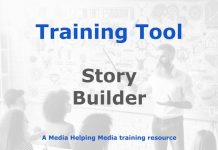
Seeking out new angles on a breaking, developing or running news story is an important part of the editorial process. Journalists have a responsibility to think through and explain how news developments affect the lives of their audience.
This process often takes place in news meetings where editorial staff discuss the implications of events in order to decide which deserve further investigation.
However, a journalist working alone will often have to work out the most important angles for themselves.
How a story develops
News stories break in many ways. Sometimes the first we hear of a story is on the news wires or via a news (press) release.
At other times a journalist will have been digging around a topic and will have come up with information that deserves further investigation.
At this stage, we often have just one or two facts. Our job is to find out more. As we do, the story develops.
Eventually, we would hope to publish a comprehensive and informative report with all angles covered. So, let’s see how this works.
Digging deeper
This is important for unearthing and following up on important news angles.
In today’s fast-paced news cycle, journalists face the constant challenge of not just reporting the news, but also digging deeper to uncover the stories behind the headlines.
Finding and following up on important news angles is crucial for impactful journalism that informs the public and holds power accountable.
1. Cultivate curiosity and a nose for news
- The foundation of finding compelling angles lies in genuine curiosity. Journalists should constantly ask “why?” and “what if?“
- Develop a habit of reading widely, not just mainstream news, but also academic journals, local blogs, and community forums.
- Pay attention to whispers and rumours – sometimes they point to bigger stories. A keen observation of your community and its dynamics is essential.
2. Go beyond the news release
Too often, journalists rely solely on news (press) releases and official statements. These are starting points, but they are not the whole story. Treat them with healthy skepticism. Ask:
- Who is benefiting from this narrative?
- What information is missing?
Always seek independent verification and diverse perspectives.
3. Develop sources and cultivate relationships
- Reliable sources are an important part of all journalism. Build relationships with people in positions of power, as well as those affected by their decisions. This takes time and effort.
- Attend community events, network, and demonstrate genuine interest in their stories.
- Always protect your sources’ anonymity when necessary. A well-placed source can provide invaluable insights and tip you off to hidden stories.
4. Follow the money
- “Follow the money” is a classic journalistic adage for a reason.
- Financial trails often lead to corruption, hidden agendas, and systemic problems.
- Learn how to access and analyse public records, campaign finance disclosures, and corporate filings. Understanding financial flows can illuminate the motivations behind events and decisions.
5. Embrace data journalism
- Data is a powerful tool for uncovering trends and patterns.
- Learn basic data analysis skills and explore publicly available datasets.
- Visualising data can make complex issues more accessible to the public and reveal compelling stories that might otherwise remain hidden.
6. Don’t be afraid to ask difficult questions
- Holding power accountable requires courage.
- Don’t shy away from asking tough questions, even to powerful individuals or institutions.
- Be persistent, but also respectful.
- Prepare thoroughly for interviews and anticipate potential pushback.
- The public deserves to know the truth, and it’s your job to seek it out.
7. Collaborate and share information
- Journalism is not a solitary pursuit. Collaborate with other journalists, both within your organisation and beyond.
- Sharing information and expertise can lead to bigger and more impactful stories.
- Consider joining investigative journalism networks and attending workshops to learn new skills and connect with colleagues.
8. Stay persistent and patient
- Investigative journalism takes time and dedication. Don’t get discouraged if your initial leads don’t pan out.
- Be prepared to spend weeks, months, or even years pursuing a story. Persistence and patience are vital if you are to uncover important news angles.
9. Think long-term and consider the bigger picture
- Don’t just focus on the immediate news. Think about the long-term implications of events and decisions.
- How will they affect the community?
- What are the systemic issues at play?
- By considering the bigger picture, you can uncover stories that have lasting significance.
10. Be ethical and transparent
- Integrity is paramount. Adhere to the highest ethical standards in your reporting.
- Be transparent about your methods and sources.
- Correct any errors promptly and acknowledge any conflicts of interest.
- Building trust with the public is essential for the credibility of your work.
Finding and following up on important news angles is challenging but rewarding. By cultivating curiosity, developing sources, embracing data, and asking difficult questions, journalists can play a vital role in informing the public and holding power accountable.

Questions
- What is the primary responsibility of journalists when reporting on news developments
- How do news stories typically break, and what role do news wires and news (press) releases play in this process?
- Why is cultivating curiosity important for journalists seeking compelling news angles?
- What are some strategies journalists can use to go beyond the information provided in news releases?
- How can developing sources and cultivating relationships benefit journalists in their reporting?
- Explain the significance of the phrase “follow the money” in journalism.
- What role does data journalism play in uncovering news stories, and what skills are essential for it?
- Why is it important for journalists to ask difficult questions, and how should they prepare for potential pushback?
- How can collaboration among journalists lead to more impactful stories?
- Discuss the importance of ethics and transparency in journalism and how they contribute to building public trust.
Answers
- Journalists are responsible for explaining how news developments affect the lives of their audience.
- News stories often break through news wires or press releases, serving as initial sources of information.
- Curiosity drives journalists to ask questions and explore deeper stories beyond surface-level information.
- Journalists should treat news releases with skepticism, seek independent verification, and explore diverse perspectives.
- Building relationships with sources can provide journalists with valuable insights and access to hidden stories.
- “Follow the money” suggests that financial investigations can reveal corruption and hidden agendas.
- Data journalism uses data analysis to uncover trends and patterns, requiring skills in data analysis and visualisation.
- Asking difficult questions holds power accountable; journalists should prepare thoroughly and anticipate resistance.
- Collaboration allows journalists to share information and expertise, leading to more comprehensive and impactful stories.
- Ethics and transparency ensure credibility and trust, as they involve adhering to standards and being open about methods.
Lesson plan for trainers
If you are a trainer of journalists we have a free lesson plan: News angles which you are welcome to download and adapt for your own purposes.









